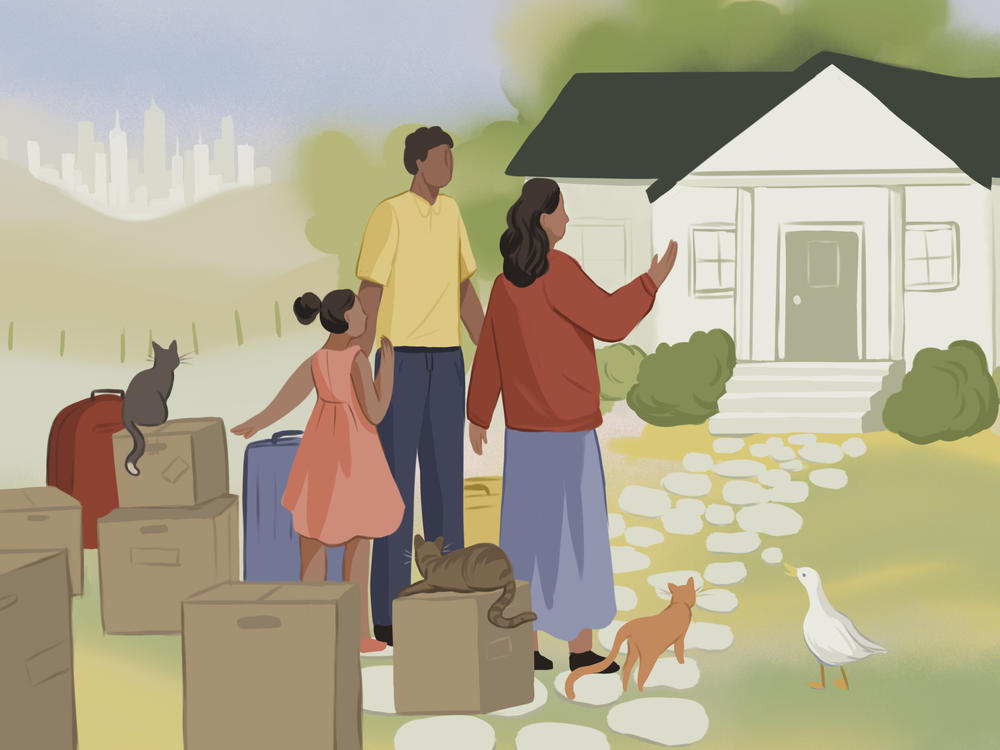Loading...
Section Branding
Header Content
Why America Is Moving: Money, Space, Family, Lifestyle ...
Primary Content
Chicago's city life suited Anna Johnson, who lived downtown for about 10 years, working as a digital producer at an advertising agency. But when the pandemic dragged on beyond a few weeks and the glitzy city closed its doors, the independent life became too quiet.
"I started to feel really lonely in my apartment by myself, and I just kind of felt trapped," Johnson says.
She decided in June to move back in with her parents who live about two hours away from the city in Rockford, Ill. Johnson says the move has been good for her, mentally and also financially.
In the early days of the pandemic, many people escaped crammed apartments in crowded cities to airy suburbs and more open locales to escape the deadly disease. And as remote work became an option for many, people suddenly felt that they had more freedom to choose where they lived and they no longer had to be tethered to where their employers were located.
And just like that, 2020 made moving a reality for millions of Americans. Some, like Johnson, moved in with their parents to be around family and even save on rent. For others, it finally gave them the excuse to give serious attention to pre-pandemic pipe dreams, such as moving to distant locations across the country in pursuit of a better lifestyle and a cheaper cost of living.
Indeed, 33% of people who moved during the pandemic did so for financial reasons, according to a study conducted by Pew Research Center.
"A third of adults told us that money troubles of some kind, including the fact that they lost their job, was the main reason driving them to move on account of the virus," says D'Vera Cohn, senior writer and editor at Pew Research Center.
The moves were most dramatic in the largest, most expensive, and most densely populated cities, like New York, Chicago, San Francisco and Los Angeles.
An analysis of U.S. Postal Service change-of-address data from February to July of last year found that moves out of New York City's Manhattan and Brooklyn buroughs more than quadrupled. Overall in the country, temporary change-of-address requests were up almost 27% in that time period, according to MYMOVE, which analyzed the data.
There's expectations that these moves could continue. Real estate brokerage firm Redfin found in a recent survey that a third of homebuyers and sellers would consider moving to a different city or area if remote work becomes permanent.
Some people have already moved thousands of miles away. Chandra Prater, a stay-at-home mom, and her husband had talked for years of leaving Los Angeles, where they lived with their kid and pets.
The pandemic had been especially hard on their 10-year-old daughter. The sudden adjustment of being in the home all the time left her feeling isolated.
"She became so depressed she wouldn't eat or get out of bed," Prater says. "No 10-year-old should live like that. It was completely heartbreaking."
Her husband, who works in information technology, started working from home in March last year. Moving out of Los Angeles was already on their minds and the oppressive heat of the summer had started to weigh on them.
But the couple didn't consider it seriously until his company said he'd probably never need to be in the office as much as before. That took the pressure off and made the decision to move easier. So, Prater, her husband, their daughter, five cats, and their duck packed up and moved to Olympia, Wash.
Prater's daughter and their duck love the rain, so far. "She loves being able to be in nature. One of the first times it rained, after we moved here, she just went out in stretch pants and a T-shirt to play in the rain," Prater says, noting that her daughter is happier.
Copyright 2021 NPR. To see more, visit https://www.npr.org.
Correction
An earlier version of the table contained a calculation error. The table and the corresponding data point in the story have been corrected.

